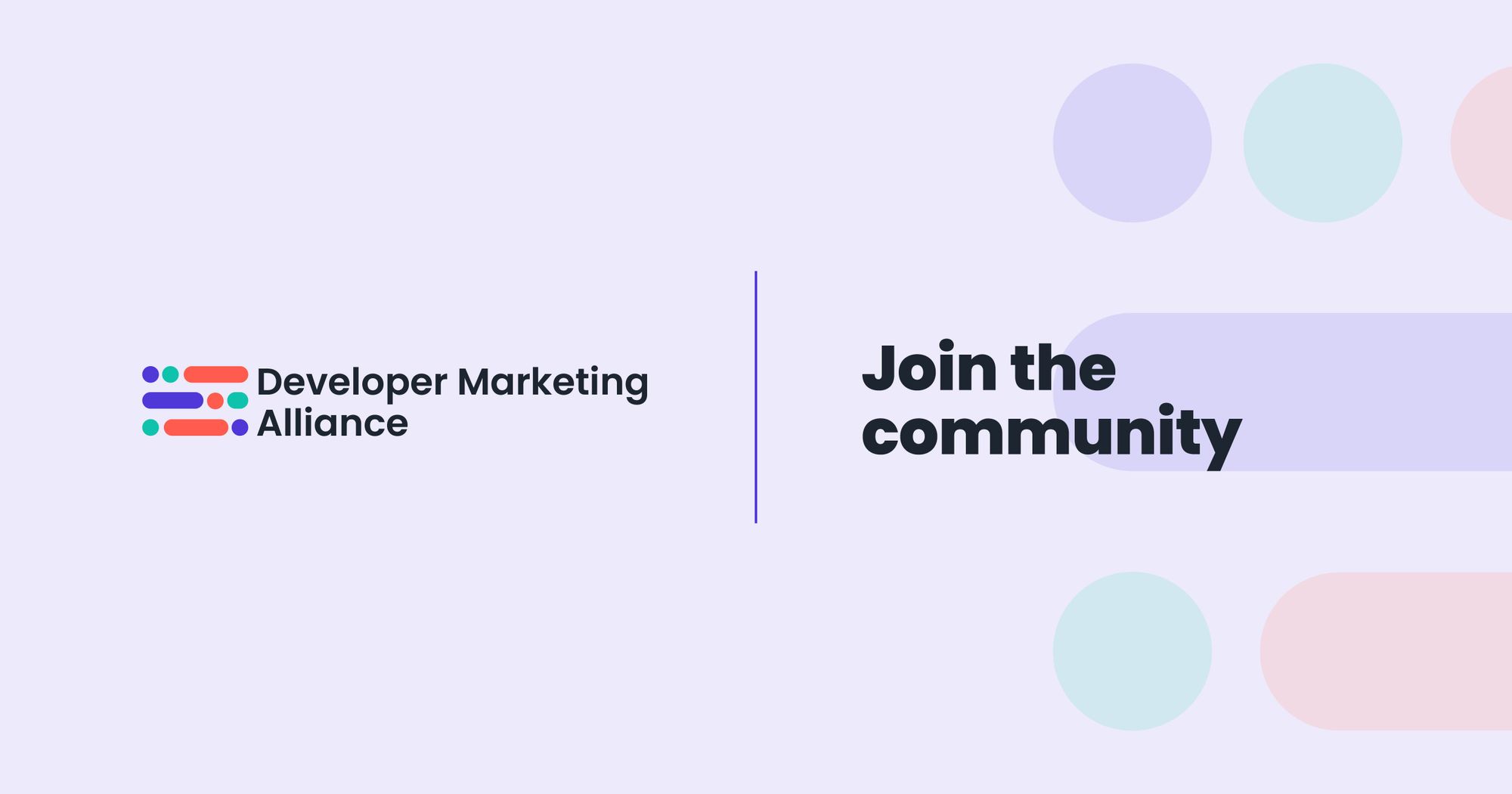"Developers don’t like marketing".
This doesn’t have to be true. Developer and platform marketing deserves a seat at the table and has an essential role in the growth and scale of a business.
During our fantastic Developers Marketing Summit in March 2022, Averie Wong, Product Marketing Manager of Developer Platform & Experience at LinkedIn, led a panel discussion sharing their experiences and insights on scaling developer outreach & engagement programmes at some of the largest tech brands across the world with two industry experts:
- Abhishek Ratna, Head of AI/ML Developer Marketing at Google
- Karan Nigam, Senior Director of Product Marketing at Palo Alto Networks
Check out the discussion’s highlights below.👇
Tell us a bit about your background and how did you get into developer marketing?
Abhishek:
I head developer marketing programmes at Google. I've been a product marketer and a marketer for over a decade but once I landed in developer marketing at Microsoft, I fell in love with it and I've been a developer marketer ever since.
Karan:
I stumbled into developer marketing during my time at Microsoft and absolutely fell in love with it. The majority of my time at Microsoft was focused on platform marketing roles and now I'm at Palo Alto Networks.
How would you describe platform marketing and how is it different from standard product marketing?
Abhishek:
Great product marketing wins customers, but great platform marketing wins partners. Products such as iPhone and the iTunes Store, Android and the Play Store or Salesforce and AppExchange, are immensely more valuable because of the ecosystems their app developers created for them.
These products build fantastic opportunities for developers to co-create on their platforms, and have seen immense success come out of that investment. Platform marketing lets brands build relationships of trust and mutual value with developers.
These partners, not developers, need to be educated on the viability and financial opportunity of your platform. They need guidance and insights on how their customers (that is, your customers) are most likely to engage.
They desire a development experience and APIs that simplify their path to value. These are the challenges platform marketers face.
Karan:
The basic and fundamental questions of marketing are: who's the customer and what are you in the business of selling?
In product marketing, the end user is a consumer or enterprise buyer (depending on b2c or b2b), but for developer marketing or platform marketing, you’re targeting a different audience which is a developer or a creator.
Product marketing can be an inside-out view, whereas platform marketing is an outside-in view. Essentially, in the product marketing space, you tend to focus on explaining the features and capabilities of a product, which is an inside-out view of the world.
However, in platform marketing, which is an outside-in view, you're trying to explain the value of the platform, the reach, the stickiness and the ease of deployment.
On the product marketing side, you'll have the luxury of being more playful and emotive, whereas in developer marketing and platform marketing, the conversations tend to be a lot more rational.
You have to focus on how resource intensive the development process is, what's the ROI as well as what the joint GTM opportunities are.
Since developers are already playing around and researching some of the technology on their own, you can provide a lot of value by giving them early access to roadmap, beta codes, which you may or may not do in a typical product marketing role.

How do you create a platform which makes learning and innovating easy for developers? Do you think the marketing team needs to be structured differently for platform marketing vs. product marketing as a result of this?
Abhishek:
The developer marketer has to wear slightly different hats, and has to adjust to new realities because of the way developer marketing varies from standard product marketing.
There's a lot of need for structuring around community work, evangelism, and accommodating developer style activities like hackathons in your GTM motions.
Developers are highly tuned to feedback and reviews from their peers and this is one of the challenges marketers face; developers would rather listen to their own vs. a marketer.
Marketers need to think about actively building feedback loops into the product development roadmap and support plans.
Karan:
The value of community is absolutely paramount when it comes to platform marketing. In terms of how you structure your teams, your resources and your efforts, there is a very tangible need for documentation, clarity, tooling and simulations, which can be used for hands-on experience by developers.
The kind of people you hire and the kind of structure you provide to your team has to take all of that into account, which may or may not be the case in a typical product marketing role.
Of course, developers love innovation and storytelling, but they also deeply care about the efficiency of development and solving problems, so the kinds of people you hire need to help with that efficiency as well.
How have you seen platform marketing change as businesses grow and scale?
Karan:
When I joined Microsoft Teams, it was a rather small project within Microsoft and, by the time I left, the product was being used by 250 million monthly active users. I saw firsthand the scaled approach of this business. To scale, you have to evolve your thinking and your skill sets.
A few critical things happen when the product evolves from being a small platform to a large scale platform:
- Moving conversations and messaging from being purely focused on innovation to a real conversation around monetization.
- Focusing not only on the technical aspects, but also the business aspects of the platform (i.e., how easy it is to develop, how do you raise awareness for third party apps on your platform, how do you reduce the friction of adoption?).
- Storefront and distribution: start thinking about distribution versus just being a singular app (i.e., Shopify, Stripe and Spotify started as payment apps or a music app but are now pure platforms).
- Thinking about developer marketing and platform marketing from a lens of integrated marketing (i.e., what is your digital marketing strategy? How are you investing in SEM/SEOs?).
At scale, customer experience becomes a real challenge. If you take an Uber, and you have a bad experience, that bad experience may be because of the driver involved but it also reflects on the platform that is Uber.
As platforms evolve, the customer experience becomes tough to control and manage because you're relying on third-party partners.
Abhishek:
Smaller orgs, as well as orgs in the early stages, tend to lean more heavily on evangelism, speed-to-market and more tactical approaches; but, with larger orgs, there's a natural evolution to having a more balanced portfolio of evangelism and structured marketing programmes.
Smaller businesses are wired for speed-to-market but, as the business scales, we start noticing PMs priorities change.
As the product grows and starts adding more functionality, as a PM, you may need to prioritize certain APIs or SDKs over others, and present how your marketing plan aligns with the portfolio focus and OKRs of your larger parent marketing org who’s often focused on different goals.
Getting those resources and alignment in place is an art and a skill in itself, which can often overshadow the day-to-day marketing work you might be more tuned to do in smaller orgs.
On the plus side, you also have more chances to participate in brand marketing to convey your brand's purpose and values. I found engineering or product teams at larger orgs very dialed into the culture and company values.
They actively participate in what we call ‘marketing conversations’ around brand values perception and I've heard great ideas come out of my product and engineering counterparts.

What do you think about brand marketing? Do you think developers care about the brand and how has that changed in some of the companies you've been at?
Karan:
There’s a deep notion that travels around the developer marketing world, which is that developers don't care about marketing but, at least in my experience, I've not found that to be completely true.
Most developers are, in fact, developers who think about their app development process as a business and want to partner with companies that have a clear set of values and mission.
Everyone's looking to be a part of a higher purpose; if you look at some of the most successful companies like Google, Microsoft, AWS, Twilio, most of them are very largely mission-driven companies and that's a core strength of theirs.
If you look at some of the recent engagement models, like the Apple vs. Facebook data sharing issue everyone's talking about, Apple, as a platform, has decided to take a stance, and that's stemming from the brand value.
That's a great example of how a platform can change the behavior and the needed user engagement in a righteous way using their power as a brand.
Microsoft has a massive developer ecosystem and the company would create hackathon opportunities where they would get all the developers together and solve things like inclusion, accessibility, providing higher access to minorities, and not just individual apps.
Companies that have a strong sense of values and brand tend to resonate better with developers.
How can marketers establish the right business metrics for a platform business?
Abhishek:
It's absolutely crucial for marketers to master their metrics, regardless of the size of the organization, to have a seat at the table. I've seen different organizations adopt different metrics to align with their culture and with their goals.
While a one-size-fits-all approach may not work, a general broad categorization of metrics would be that metrics fall into one of three broad themes:
- Value to the business (or direct contribution either to the top line and bottom line). I.e., revenue metrics or pipeline coming from the ecosystem of developers.
- Health and engagement of the ecosystem I.e., number of active developers, number of apps published to your platform, open source contributions.
- Satisfaction. These kinds of specialty satisfaction metrics tend to be even more important in platforms which create open-source tools for developers. I.e., CSAT scores, other qualitative means or surveys.
Karan:
Marketers have a unique opportunity to be business-driven because the majority of the engagement content for developer communities tend to be self-serve and online.
Having a sense of what the metrics for raising awareness amongst developers are, whether developer signup, number of active developers, or also tracking the education, helps you curate a very good set of useful content.
If you're giving away some free APIs for developers to play around with, how many of them are using it, are they dropping off somewhere, where is the drop off happening, how many apps are getting published? Having a clearer sense of the development cycle end-to-end is good business practice.
Can you tell us about the tactics you use and learn from? What is one campaign or programme that was successful and what did you learn from it?
Abhishek:
At Google there's a saying which is: know the user, know the magic, connect the two.
Knowing the user means understanding the people whose lives you're touching with your products. Knowing the magic means truly understanding your product.
PMs are expected to have a strong handle on their products and be active proponents of removing complexity and barriers to adoption of the products.
Connecting the two means telling the product story in a relevant, useful and respectful way to your users.
When I was with Windows’ developer marketing, our business was closely tied to the Windows Store organization. As dev marketers, we needed to help app developers overcome barriers and publish apps to the store easily.
We had more than 1 million developers sign up for accounts, but only a few thousand ever published an app. Worst still, we had no qualitative or quantitative data about what these blockers were or where the developers were held up. To understand users, I innovated a little.
First, I started by collecting qualitative feedback and hypotheses from our developer support team, and our dev evangelists. Then, I borrowed this idea, which is well known to ecommerce and retail marketers called ‘recency, frequency, monetization analysis’.
The key finding from this analysis was that a majority of successful developers published their first app within 30 days of creating their accounts. If they didn’t publish an app within the first 30 days, there was a very slim chance they were ever going to publish.
This finding told me that an onboarding campaign would be most valuable. I evangelized the idea, and sought feedback from other PMM evangelists and support reps on our team and they gave me a ton of valuable ideas for campaign themes and content.
There were a lot of great ideas, so the next one challenge was packaging all this up.
To make this content helpful, I built a campaign experience across the landing page and nurtured emails where we packaged content by where a developer might be in the journey to publishing their first step.
The results were very heartening, as we saw a 25% growth in developer productivity (they were publishing 25% more apps). The email marketing metrics had phenomenal numbers and we saw a huge increase in the revenue developers generated after they've gone through this training and onboarding vs. if they hadn’t.

What advice do you have for marketers to earn the trust of their technical non-marketing stakeholders? What value can they bring to the table?
Karan:
As marketers, it's very easy to find ourselves in a situation where you're just asking the question of “how do I get a seat at the table?” but, instead of asking that question to others, you have to ask yourself “what is the unique value I’m bringing to the table?”.
In platform marketing, it's particularly relevant because you're working with people who are technically very adept (either it's your engineering stakeholders or your customers, which are developers). The unique value you can bring to the table is the deeper understanding of business from an end-to-end perspective.
If you can be the person who's bringing insights in the developer journey, tracking developer journey drop off rates, best practices from other companies in the industry, A/B experiments you want to run which could increase the attraction of developers and education of developers, then you will automatically get the respect.
Also, become the person who's in contact with or is helping the developers, the business development person, or the marketing person on the developer side, and figure out the go-to-market approach. That's unique value you can bring to the table.
Lastly, become a voice of customer. Most developers have had a chance to engage with or actively look for tangible examples of how someone else has used your platform to develop an application or a solution. Bringing customer case studies of how much time it took, what they developed, the problem they're trying to solve, how they went about the technical deployment, etc., can be really useful.
How have you found any innovative ways to scale voice of developer and your thought leadership?
Abhishek:
With thought leadership, good platform brands engage developers with how to build on their platform, and they remove those barriers and friction, but great platform marketing brands engage developers with the stories of ‘why’ and ‘how’ they developed their products the way they did.
Some examples of companies in this space who managed to do this successfully are the engineering at Netflix blog, where developers are led into the journey of Netflix's approach to problem-solving and building our products, the Uber dev blog, the Google developer blog, and the Atlassian blog.
Join our Slack community to network with other developer marketers like yourself!







